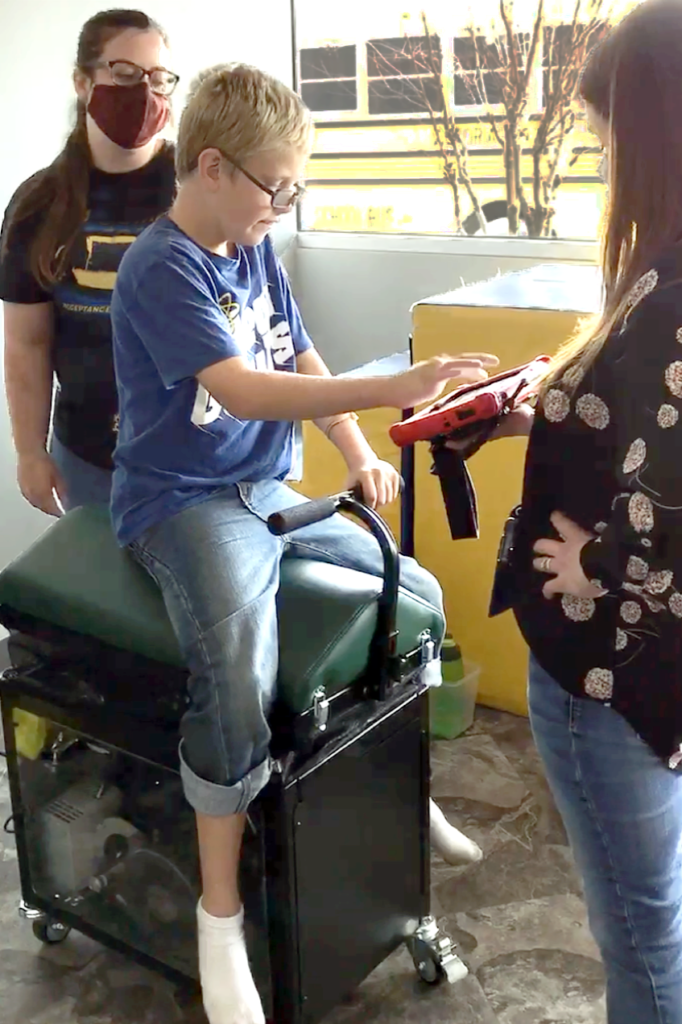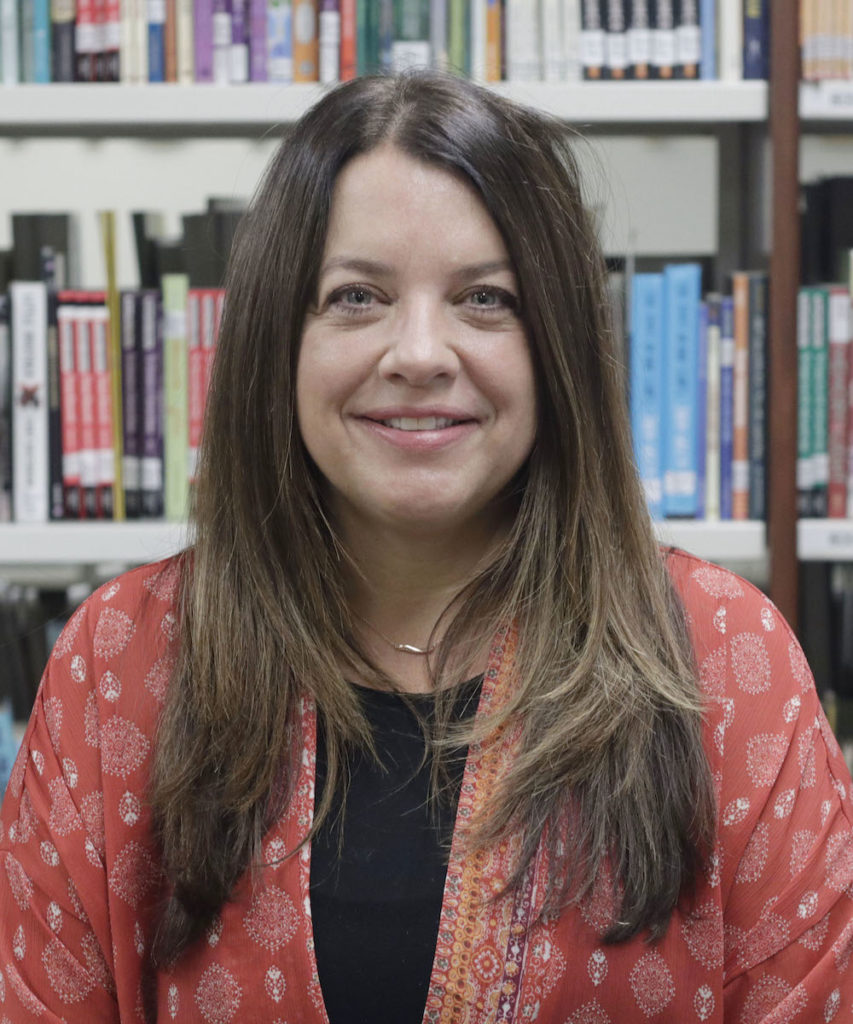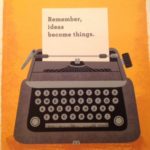By Julie Ivey
As a faculty member at Baylor, I have worked extensively helping children with autism, and I’m really excited about a current project that is innovative and free to children in the area. Our team is working one-on-one with children to improve balance, gait, behavior, and language. It’s a fun experience for the children because they do this while riding a mechanical horse.

You might have heard about the therapeutic benefits of horseback riding for children with autism; these experiences are believed to stimulate neurological connections because of the motion of the horse that the child must respond to. But not every family has access to live horses. If the mechanical horse can be effective in a clinical setting staffed by trained professionals, it can offer an excellent intervention to help children.
Through a grant from the Texas Higher Education Coordinating Board, our Baylor autism team is measuring the behavioral and language effects of riding on the MiraColt mechanical horse. Because of this funding, the experience is free to children, whose parents sign up to attend two sessions per week for 15 weeks. In fact, families who complete the study will receive $150. The project is taking place at the Baylor BRIC. Be assured that the members of our interdisciplinary team have extensive experience working with children with autism and will help the children feel comfortable in a new setting.
We are recruiting children ages 6-12 who have a diagnosis of autism and may experience motor delays. To participate, children should be able to follow simple verbal instructions and have an IQ above 80. We are accepting participants on a rolling basis this fall and spring. While the study is in its early stages, our preliminary observations are promising, and parents have said they see improvements in their children.
For a little bit more information, you can read this story from the School of Education: School of Education Autism Research Team Studies Mechanical Horse Intervention
If you think your child would be interested and would qualify, we will begin with a meet-and-greet session to show you what it is all about, meet your child, and let you explore the space.
For more information, please mail me at Julie_Ivey@baylor.edu! We are excited to work with children and the community on this exciting, innovative project!

Julie Ivey, Ph.D., is a clinical professor in the Baylor University School of Education.
The Act Locally Waco blog publishes posts with a connection to these aspirations for Waco. If you are interested in writing for the Act Locally Waco Blog, please email Ferrell Foster at ferrell@prosperwaco.org.
By Alicia
What comes to your mind when I say Autistic? Who do you picture in your head? Perhaps a child in your neighborhood who flaps their hands with happiness? Or an adolescent who gives you a detailed account of the solar system’s activities? Maybe the adult from church, who rocks back-and-forth during most services?
Perhaps you have heard that autism is a spectrum. But what does that mean? Autism is a developmental disability and another way of being in the world. To describe behavioral traits common to autistic people, we begin with the medical model, the DSM-5 entry for autism spectrum disorder (APA, 2013, pp. 50-51).
– Social communication impairments
– Restricted and/or repetitive behavioral patterns
**********************************
But this entry isn’t complete. It describes what autism looks like, but fails to describe the everyday lives of Autistic individuals. I lapse into academic language when I try to write about autism from a perspective other than my own. I attempt to describe autism in behavioral terms, rather than lived experiences, and get lost in this phrasing.
It is no easier to write about autism from a clinical perspective. For me, the personal is academic. I began reading about autism because I wanted to better understand my friend from undergraduate studies, a young woman with Asperger syndrome.
***************************************
“Many of us will become interested in psychology and the helping professions along the way, either because of our diagnosis or in search of it. We find we want to nurture and help others in their journeys because we know how hard it can be.” ~ Rudy Simone, Aspergirls
Perhaps I am in-between these spaces — the personal and the academic. Not entirely ready to come out, for fear I might be wrong about myself. For the past two years, I’ve read autism blogs and books, immersed myself in the online Autistic community, and befriended women like me. We are writing a narrative of what #AcceptanceMeans.
*****************************************************
Becoming (not finding) yourself is neither a linear, nor coherent process. In the spring of 2013, I first acknowledged my Autistic traits. I remember reading Rudy Simone’s book, Aspergirls. I took copious notes, surprised how the experiences she described resonated with my own.
With the support of the women in my writing circle and like-minded women online, I continued to explore this narrative through research and poetry. April is Autism Acceptance Month. Perhaps acceptance begins with myself.
*****************************************************************
How long will I have to mince my words? You see, I have these traits – I’m 85 to 95% sure that this is who I am. I’ve lived in euphemistic dialogue for some time now…
I’m socially different, sensory sensitive; missing gist for detail. This is who I am, regardless of how you choose to see me, label me. We sustain ourselves in these Voldemorty spaces – that which shall not be named.
I’m autistic. Not that you’ll believe me. We’re unicorns. The highly verbal, completely awkward, often confused. I’m not a 12-year-old boy who likes trains. Does that surprise you? It shouldn’t.
My passions are information gathering, sorting, and sensemaking. That’s why I’m here today. I brought a list of all the things you might think are wrong with me – I prefer different. This is merely a collection of traits – some of which get me stuck. Please don’t medicalize me, marginalize me.
This is new to you. Not to me – I’ve been this way my entire life – just hadn’t found my coherent narrative. Hadn’t imagined there were others like us, rising in dust and hashtagging it – dialoguing across countries and timezones. Other women like me, yet utterly alien in their own spaces.
We are developing our own dialogue, a shared narrative – together. I see us in a decent-sized room, sitting at a table, offering virtual cups of tea.
Remembering.
Verbalizing.
Being.
In this created space – creative space. We are ourselves, with little explanation. Needing no one else to fill in our gaps. We are our own. Here anyway. Coda. Yet this space, although not enough, is a starting point. Free from labels or to label as we wish. Existing together in a shared collage of narratives.
Of course this text-based medium would serve us well. Free from constraints of nonverbals and missed cues.
We are here in this place. We fit. We belong. And we are enough. Together.
 Alicia is a graduate student at Baylor University. She writes for reasons both pragmatic and personal. She became involved in the Waco arts community through In the Words of Womyn – Heart of Texas.
Alicia is a graduate student at Baylor University. She writes for reasons both pragmatic and personal. She became involved in the Waco arts community through In the Words of Womyn – Heart of Texas.
For more information about Autistic women, visit Autism Women’s Network (http://autismwomensnetwork.org).
For general autism resources, visit Autism Society (http://www.autism-society.org) and Autistic Self Advocacy Network (http://autisticadvocacy.org)
Local programs for individuals on the autism spectrum include:
- Heart of Texas Autism Network (http://www.hotautismnetwork.org)
- ARC of McLennan County (http://www.wacoarc.org)
- Baylor Center for Developmental Disabilities (http://www.baylor.edu/bcdd/)
The Act Locally Waco blog publishes posts with a connection to these aspirations for Waco. If you are interested in writing for the Act Locally Waco Blog, please email ashleyt@actlocallywaco.org for more information.
References:
American Psychiatric Association. (2013). Diagnostic and statistical manual of mental disorders (5th ed.). Washington, DC: Author
